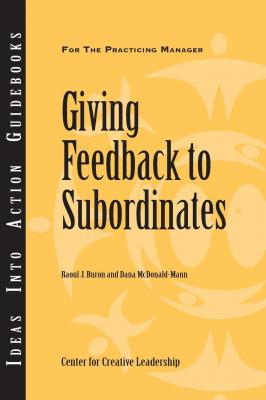Giving Feedback to Subordinates. Raoul Buron
Чтение книги онлайн.
Читать онлайн книгу Giving Feedback to Subordinates - Raoul Buron страница

AN IDEAS INTO ACTION GUIDEBOOK
Giving Feedback to Subordinates
IDEAS INTO ACTION GUIDEBOOKS
Aimed at managers and executives who are concerned with their own and others’ development, each guidebook in this series gives specific advice on how to complete a developmental task or solve a leadership problem.
| LEAD CONTRIBUTORS | Raoul J. Buron |
| Dana McDonald-Mann | |
| GUIDEBOOK ADVISORY GROUP | Victoria A. Guthrie |
| Cynthia D. McCauley | |
| Russ S. Moxley | |
| DIRECTOR OF PUBLICATIONS | Martin Wilcox |
| EDITOR | Peter Scisco |
| WRITER | Janet Fox |
| DESIGN AND LAYOUT | Joanne Ferguson |
| CONTRIBUTING ARTISTS | Laura J. Gibson |
| Chris Wilson, 29 & Company | |
| RIGHTS AND PERMISSIONS | Kelly Lombardino |
Copyright © 1999 Center for Creative Leadership.
All Rights Reserved. No part of this publication may be reproduced, stored in a retrieval system, or transmitted, in any form or by any means, electronic, mechanical, photocopying, recording, or otherwise, without the prior written permission of the publisher. Printed in the United States of America.
CCL No. 403
ISBN-13: 978-1-882197-39-2
ISBN-10: 1-882197-39-9
CENTER FOR CREATIVE LEADERSHIP
AN IDEAS INTO ACTION GUIDEBOOK
Giving Feedback to Subordinates
Raoul J. Buron and Dana McDonald-Mann
THE IDEAS INTO ACTION GUIDEBOOK SERIES
This series of guidebooks draws on the practical knowledge that the Center for Creative Leadership (CCL) has generated since its inception in 1970. The purpose of the series is to provide leaders with specific advice on how to complete a developmental task or solve a leadership challenge. In doing that, the series carries out CCL’s mission to advance the understanding, practice, and development of leadership for the benefit of society worldwide.
CCL’s unique position as a research and education organization supports a community of accomplished scholars and educators in a community of shared knowledge. CCL’s knowledge community holds certain principles in common, and its members work together to understand and generate practical responses to the ever-changing circumstances of leadership and organizational challenges.
In its interactions with a richly varied client population, in its research into the effect of leadership on organizational performance and sustainability, and in its deep insight into the workings of organizations, CCL creates new, sound ideas that leaders all over the world put into action every day. We believe you will find the Ideas Into Action Guidebooks an important addition to your leadership toolkit.
Table of Contents
Why Give Feedback to Subordinates?
When to Give Feedback to Subordinates
How to Give Feedback to Subordinates
How to Build the Feedback Relationship
How to Structure the Feedback Session
How to Handle Feedback’s Emotional Impact
Subordinate Feedback Checklist
IN BRIEF
If you’re a manager with people who report directly to you, it’s important that you give them feedback on their behavior and performance. Most of your employees want to do a good job. Many are unaware of the impact of their behavior on their job performance, for good or bad. Feedback from you, their manager, can help them identify what they are doing well and build on those skills, correct problems, and develop new abilities that improve not just their personal lives but also the organization in which they and you work. This guidebook will tell when you should give feedback, how you should deliver it, and how to manage its results.
Why Give Feedback to Subordinates?
Most of your employees want to do a good job. Many are unaware of the impact of their behavior on their job performance, for good or bad. Feedback from you, their manager, can help them identify what they are doing well and build on those skills, correct problems, and develop new abilities that improve not just their personal lives but also the organization in which they and you work.
Effective feedback provides the necessary information people need to build on their strengths and to shore up weaknesses. It’s a powerful tool for accelerating learning and for developing mastery. Stop and think about the last time you learned a new skill. Whether it was golf or square dancing, you depended on the feedback from a professional or an experienced enthusiast to help you capitalize on your strengths and to see the weaknesses in your performance. Without such feedback, the probability is that you would not identify your best skills and that weaknesses and errors would become ingrained through practice and repetition.
Given its potential to bolster improved performance, managers should eagerly supply feedback to their subordinates. But it doesn’t happen often. Most people work without the benefits of effective feedback. For whatever reason, managers find it hard to give the feedback to their subordinates that they need, want, and deserve.
To succeed in your leadership role, you